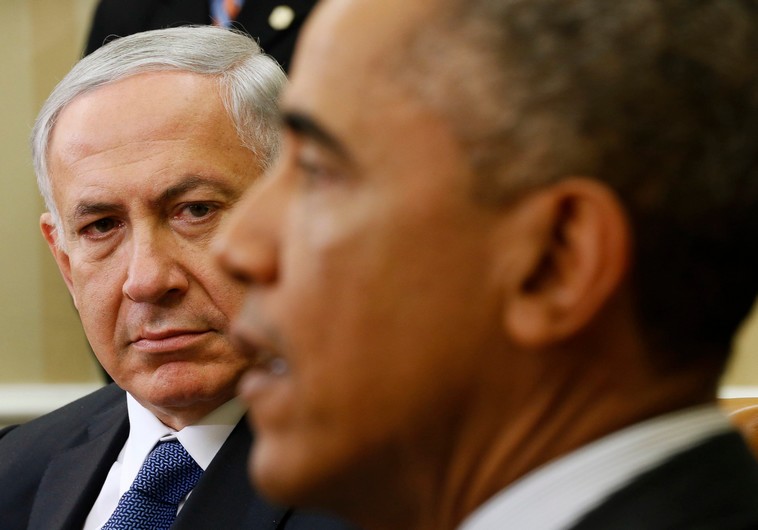U.S. rebukes victorious Netanyahu on Mideast policy
Agencies/Mar. 19, 2015
CLEVELAND: The White House Wednesday scolded Israeli Prime Minister Benjamin Netanyahu following his re-election victory for abandoning his commitment to negotiate for a Palestinian state and for what it called “divisive” campaign rhetoric toward Israel’s minority Arab voters.
Even as President Barack Obama’s administration congratulated Netanyahu for his party’s decisive win in Tuesday’s ballot, the White House signaled its deep disagreements – and thorny relationship – with Netanyahu will persist on issues ranging from Middle East peacemaking to Iran nuclear diplomacy.
Netanyahu’s Likud party looked set to win 30 seats in the 120-member Knesset, comfortably defeating the center-left Zionist Union opposition with 24 seats, after exit polls on the night of the election showed the two sides to be in a near dead heat.
A united list of 1948 Palestinian parties came third.
The result was a dramatic and unexpected victory for Netanyahu – the last opinion polls four days before the vote had shown Likud trailing the Zionist Union by four seats.
President Reuven Rivlin said he would launch consultations with party leaders Sunday to try and form a new government as soon as possible.
Isaac Herzog, leader of the Zionist Union, conceded defeat and congratulated Netanyahu, adding that he would not seek to join a Netanyahu-led government.
Although Netanyahu must still put together a coalition to remain in power, his victory all but guarantees that Israel’s president will give him the first opportunity to form a government, putting him on course to become the longest-serving leader in Israeli history.
In a hard-right shift in the final days of campaigning, Netanyahu backtracked on his support for eventual creation of a Palestinian state, the cornerstone of over two decades of peace efforts – and promised to go on building Jewish settlements on occupied land. Such policies could put him on a new collision course with the Obama administration.
White House spokesman Josh Earnest reaffirmed Obama’s commitment to a two-state solution and said that based on Netanyahu’s comments, “the United States will evaluate our approach to this situation moving forward.”
He said the U.S. believes that establishment of a Palestinian state living side by side in peace and security with a Jewish state of Israel is “the best way to defuse regional tensions.”
Netanyahu’s insistence that there will be no Palestinian state while he holds office – seen as a maneuver to mobilize his right-wing base when his re-election prospects were flagging – angered the Palestinians and drew criticism from the United Nations and European governments. Chances for restarting long-stalled Middle East peace moves already had been very low.
Speaking to reporters aboard Air Force One on the way to Cleveland, Earnest said the administration would communicate its concern directly to the Israeli government over criticized rhetoric used by Netanyahu’s campaign.
He charged on election day in Israel that left-wingers were trying to get Arab-Israeli voters out “in droves” to sway the election against him.
“The United States and this administration is deeply concerned about rhetoric that seeks to marginalize Arab-Israeli citizens,” Earnest said. “It undermines the values and democratic ideals that have been important to our democracy and an important part of what binds the United States and Israel together.” Palestinians comprise about 20 percent of Israel’s population of 8 million and have long complained about discrimination.
Two weeks ago Netanyahu defied Obama with a politically divisive speech to Congress attacking U.S.-led nuclear talks with Iran. The final days of campaigning only served to deepen tensions with the White House.
Despite U.S. concerns, Earnest said Secretary of State John Kerry had called Netanyahu to congratulate him on his election victory and Obama would follow suit “in coming days.”
“The unprecedented security cooperation between the United States and Israel, including our strong military and intelligence relationship will continue and that relationship will continue,” Earnest said.
U.S. officials had left little doubt they hoped for an election outcome that would create a new ruling coalition more in sync with – or at least less hostile to – Obama’s agenda, especially with an end-of-March deadline looming for a nuclear deal in negotiations between Tehran and world powers.
The United Nations and France also said they expected Israel to continue with the Middle East peace process to negotiate a Palestinian state.
“Only the creation of viable sovereign Palestinian state … will ensure peace and prosperity in the Middle East,” French Foreign Minister Laurent Fabius said in a statement, calling for negotiations to resume to achieve “a comprehensive and lasting peace accord.”
Saeb Erekat, chief Palestinian negotiator in peace talks that collapsed last year, lamented “the success of a campaign based on settlements, racism, apartheid and the denial of the fundamental rights of the Palestinian people.”






















